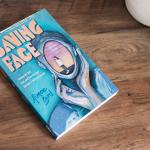I’m over at Stand Firm today.
Well, I managed to stay offline nearly all of yesterday, floating on a triumphant exultant glow of having procured nine whole dining room chairs for a total of 36 dollars (how many talents is that—so many) and strong-momming my children into moving a lot of furniture around and cleaning up my house. It was so great and made the crash of sitting in one of those sturdy chairs at the end of the day and watching this all the more irritating. It’s the new German ad campaign to keep people from going out in order to stop the spread of the ‘rona. It features a comfortable looking older gentleman reminiscing about his youth—that time in 2020 when he became a hero by staying home and “doing nothing.” There are cutaways to a darkened room where a single young man is lying on his couch. The old man chuckles. And then it’s all over. I mean—not in some epic cosmic sense, but just the public service announcement. Although, the bleakness of it put me right in the frame of mind to take a gander at this morning’s gospel.
“For it will be,” says Jesus, taking up his discourse in the short time he has left before his own death, “like a man going on a journey,” a there and back again if you will. Only you won’t know about what the man is up to, it will be what he leaves behind that captures the listener’s attention. The man who goes away is a person of property. He will leave his servants in charge of his wealth, and expects them to make something of it while he is gone.
This seems to me like something from the long past—like the 80s—where people had immense trust in each other, wandering around without cellphones or tracking devices. Where children rode their bikes up and down and their parents smiled at them at the end of a long day and then poured out another martini. It’s hard to imagine a world where someone would trust all the people, even the untrustworthy ones, to do something, would go away to do other things, and then come back after a while without texting first or giving any warning.
The first two servants do well. They take the money and go make more money. But the last one falls apart—or seems to. He takes what he is given and buries it in the ground. “Master,” he says, “I knew you to be a hard man…so I was afraid, and I hid your talent in the ground.” The master is incensed, as the man should have expected. For surely, the man spoke through many prophets, promising to come suddenly to his own for a reckoning:
At that time I will search Jerusalem with lamps,
and I will punish the men
who are complacent,
those who say in their hearts,
‘The Lord will not do good,
nor will he do ill,’
cries God in Zephaniah. As if none people in Jerusalem in that day knew what he was like or bothered to know or were curious at all. No one has said this, but the lines, “I was afraid…so I hid,” struck me sideways, as if I’d heard them somewhere before. They seem always to be appearing through the whole Bible, from those first moments when God put a man in charge of his whole world and stood back for a few minutes to see what he, the man, would make of it. And the thing that he, the man, concluded as he wandered around that beautiful place, the sun glinting off the leaves of a thousand bright new trees, the grass soft and cool, the sky clear and expansive, was that his God was “a hard man,” and also that “The Lord will not do good.”
Whence the fear?…read the rest here.

















